GPs advised to warn about ‘difficult decisions’ around hospital admissions

Hundreds of practices in North West London have been advised to tell the relatives of care home patients who lack capacity that ‘difficult decisions’ will need to be made around admitting these patients to hospital.
The guidance from the area’s Covid-19 community response team was sent to the 360 GP practices within eight CCGs yesterday (Thursday 2 April), and also advises GPs to focus on anticipatory care plans with their care home residents.
North West London has been identified as one of the worst-hit locations in the country by Covid-19, with Northwick Park Hospital the first in the UK to declare a ‘critical care incident’ when its Harrow facility became unable to accept further Covid-19 patients on 20 March.
The authors of the guidance stress that GPs routinely have conversations with patients and their families about personalised care plans, and that all clinical decisions should be made on an individual basis.
As part an example of recommended wording to communicate DNACPR decisions for relative of patients who lack capacity and live in nursing or residential homes, it states that this is an ‘unprecedentedly difficult time’.
It adds: ‘We have been receiving reports from hospitals, both locally and nationally, that elderly patients and those with other medical conditions or frailty, who are infected with Covid-19, will very sadly, in many cases, become very unwell. We also know that elderly patients, especially those with other co-morbidities and frailty do not benefit from aggressive hospital treatment.
‘We are, therefore, having to make difficult decisions regarding the benefit of sending our elderly patients to hospital and the appropriateness of attempting to re-start their hearts if they were to stop beating (CPR or cardiopulmonary resuscitation). The decision about this treatment is a medical one, but it is one in which we must inform patients and/or their relatives of the conclusion made…
‘We are very sorry for any distress that this decision may cause, but I hope you understand why this has been necessary in view of the current situation we all find ourselves in.’
The guidance also says each patient’s registered GP will have overall responsibility for ensuring that ACPs are developed and implemented.
RCGP; Hospice UK; Marie Curie and NHS England also contributed to the resource, which follows the BMA’s revised guidance on ethical issues.
The BMA’s section on the impact on general practice states GPs will be dealing with ‘most health need in the community. As such, they are going to be under even more intense pressure.’
The guidance also reads: ‘Doctors would be obliged to implement decision-making policies which mean some patients may be denied intensive forms of treatment that they would have received outside a pandemic.
‘Health professionals may be obliged to withdraw treatment from some patients to enable treatment of other patients with a higher survival probability.’
Dr Lyndsey Williams, Macmillan GP at Brent CCG, who has a focus on end-of life care and helped to devise the resources, told Pulse: ‘The aim is to support GPs and community healthcare colleagues in preparation and to continue to offer personalised support to their patients during the Covid-19 pandemic.
‘Our goal is to ensure healthcare professionals are continuing to have the right conversations respecting patient’s wishes and delivering high-quality palliative care in the community.’
Central London CCG chair Dr Neville Purssell added: ‘The request for this guidance came from GPs. Conversations with patients about advanced care planning are not new to them, but many indicated that they would value advice on how to approach these conversations in the current climate.’
Pulse October survey
Take our July 2025 survey to potentially win £1.000 worth of tokens

Visit Pulse Reference for details on 140 symptoms, including easily searchable symptoms and categories, offering you a free platform to check symptoms and receive potential diagnoses during consultations.










